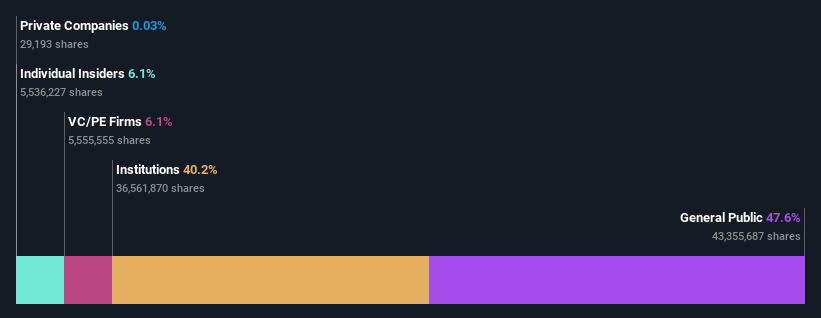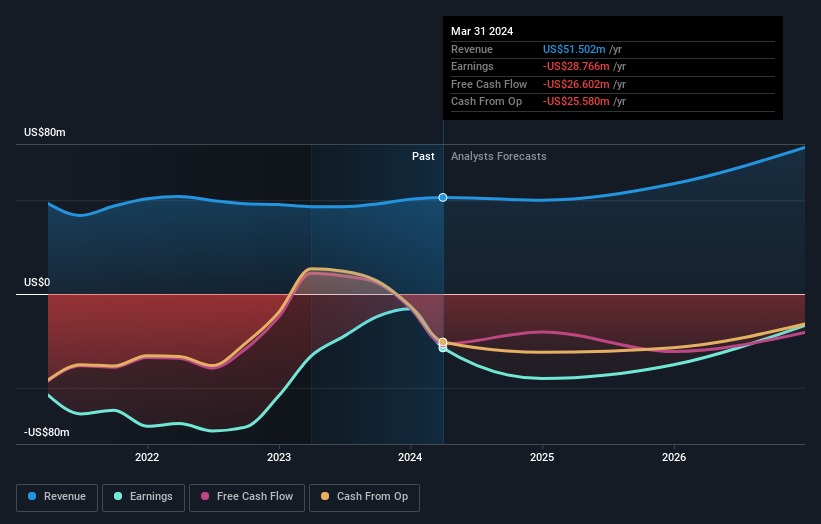- United States
- /
- Pharma
- /
- NasdaqGM:AQST
Institutions along with individual investors who hold considerable shares inAquestive Therapeutics, Inc. (NASDAQ:AQST) come under pressure; lose 14% of holdings value

Key Insights
- The considerable ownership by individual investors in Aquestive Therapeutics indicates that they collectively have a greater say in management and business strategy
- The top 25 shareholders own 42% of the company
- Institutions own 40% of Aquestive Therapeutics
A look at the shareholders of Aquestive Therapeutics, Inc. (NASDAQ:AQST) can tell us which group is most powerful. And the group that holds the biggest piece of the pie are individual investors with 48% ownership. That is, the group stands to benefit the most if the stock rises (or lose the most if there is a downturn).
While the holdings of individual investors took a hit after last week’s 14% price drop, institutions with their 40% holdings also suffered.
Let's take a closer look to see what the different types of shareholders can tell us about Aquestive Therapeutics.
See our latest analysis for Aquestive Therapeutics

What Does The Institutional Ownership Tell Us About Aquestive Therapeutics?
Many institutions measure their performance against an index that approximates the local market. So they usually pay more attention to companies that are included in major indices.
As you can see, institutional investors have a fair amount of stake in Aquestive Therapeutics. This implies the analysts working for those institutions have looked at the stock and they like it. But just like anyone else, they could be wrong. If multiple institutions change their view on a stock at the same time, you could see the share price drop fast. It's therefore worth looking at Aquestive Therapeutics' earnings history below. Of course, the future is what really matters.

Aquestive Therapeutics is not owned by hedge funds. Bratton Capital Management, L.P. is currently the largest shareholder, with 11% of shares outstanding. For context, the second largest shareholder holds about 6.1% of the shares outstanding, followed by an ownership of 3.6% by the third-largest shareholder. Furthermore, CEO Daniel Barber is the owner of 1.5% of the company's shares.
Our studies suggest that the top 25 shareholders collectively control less than half of the company's shares, meaning that the company's shares are widely disseminated and there is no dominant shareholder.
While studying institutional ownership for a company can add value to your research, it is also a good practice to research analyst recommendations to get a deeper understand of a stock's expected performance. Quite a few analysts cover the stock, so you could look into forecast growth quite easily.
Insider Ownership Of Aquestive Therapeutics
The definition of company insiders can be subjective and does vary between jurisdictions. Our data reflects individual insiders, capturing board members at the very least. Company management run the business, but the CEO will answer to the board, even if he or she is a member of it.
Insider ownership is positive when it signals leadership are thinking like the true owners of the company. However, high insider ownership can also give immense power to a small group within the company. This can be negative in some circumstances.
We can see that insiders own shares in Aquestive Therapeutics, Inc.. In their own names, insiders own US$13m worth of stock in the US$221m company. This shows at least some alignment. You can click here to see if those insiders have been buying or selling.
General Public Ownership
With a 48% ownership, the general public, mostly comprising of individual investors, have some degree of sway over Aquestive Therapeutics. While this group can't necessarily call the shots, it can certainly have a real influence on how the company is run.
Private Equity Ownership
Private equity firms hold a 6.1% stake in Aquestive Therapeutics. This suggests they can be influential in key policy decisions. Sometimes we see private equity stick around for the long term, but generally speaking they have a shorter investment horizon and -- as the name suggests -- don't invest in public companies much. After some time they may look to sell and redeploy capital elsewhere.
Next Steps:
I find it very interesting to look at who exactly owns a company. But to truly gain insight, we need to consider other information, too. Case in point: We've spotted 4 warning signs for Aquestive Therapeutics you should be aware of, and 2 of them are a bit unpleasant.
But ultimately it is the future, not the past, that will determine how well the owners of this business will do. Therefore we think it advisable to take a look at this free report showing whether analysts are predicting a brighter future.
NB: Figures in this article are calculated using data from the last twelve months, which refer to the 12-month period ending on the last date of the month the financial statement is dated. This may not be consistent with full year annual report figures.
New: Manage All Your Stock Portfolios in One Place
We've created the ultimate portfolio companion for stock investors, and it's free.
• Connect an unlimited number of Portfolios and see your total in one currency
• Be alerted to new Warning Signs or Risks via email or mobile
• Track the Fair Value of your stocks
Have feedback on this article? Concerned about the content? Get in touch with us directly. Alternatively, email editorial-team (at) simplywallst.com.
This article by Simply Wall St is general in nature. We provide commentary based on historical data and analyst forecasts only using an unbiased methodology and our articles are not intended to be financial advice. It does not constitute a recommendation to buy or sell any stock, and does not take account of your objectives, or your financial situation. We aim to bring you long-term focused analysis driven by fundamental data. Note that our analysis may not factor in the latest price-sensitive company announcements or qualitative material. Simply Wall St has no position in any stocks mentioned.
Have feedback on this article? Concerned about the content? Get in touch with us directly. Alternatively, email editorial-team@simplywallst.com
About NasdaqGM:AQST
Aquestive Therapeutics
Operates as a pharmaceutical company in the United States and internationally.
Slight and fair value.


